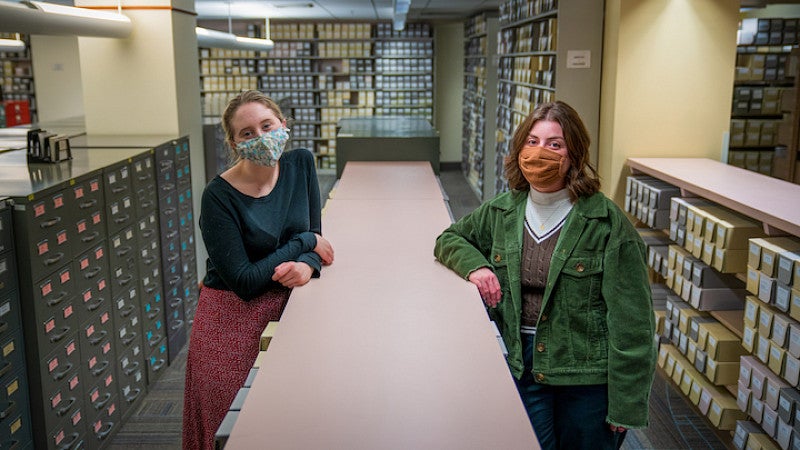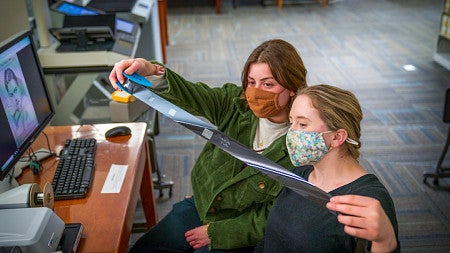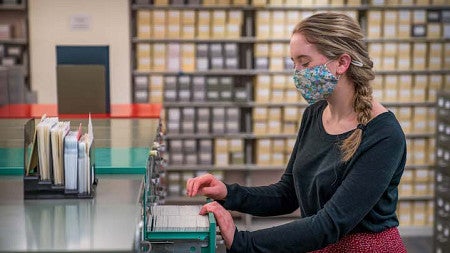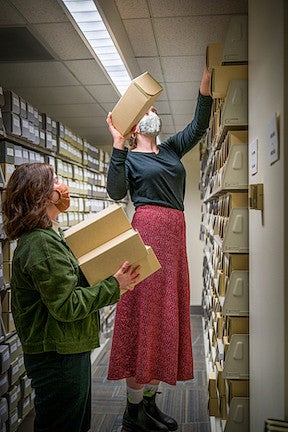
Morning Glory Ritchie and Malia Mulligan served as assistant editors in a digital book project about feminist Fredi Washington.
Stories by Malia Mulligan and Morning Glory Ritchie
Photos by Jasper Zhou, CHC Communications
As research assistants to Acting Clark Honors College Dean Carol Stabile, Malia Mulligan and Morning Glory Ritchie got an opportunity that many undergraduates don’t—to contribute to the research and production of a digital book. As editorial assistants, the two dug deep into archives, scouring through microfilm and trying to decipher what the aged, sometimes blurry sources were trying to tell them.
Their hard work will be celebrated on February 3 with the book launch of Fredi Washington: A Reader in Black Feminist Media Criticism at 3 pm. The event will take place on Zoom (https://www.eventcreate.com/e/frediwashingtonbooklaunch) and is open to the public. Also scheduled to speak are volume co-editors Roopika Risam and Carol Stabile, along with special guest, historian and author Laurie Avant Woodard.
Malia Mulligan
Last February I began working on a project alongside one of my peers in the CHC, Morning Glory Ritchie, and with Acting Clark Honors College Dean, Carol Stabile, to transcribe hundreds of newspaper columns from the 1940s written by a woman named Fredi Washington. Washington was the “theatrical editor” for The People’s Voice, but her title did not determine her expertise, nor did it confine her columns to the subject of theater. Instead, she confidently used her platform to share her opinions on other matters when she felt it was necessary to do so, and she also used it to stand up for herself and others.
Interacting with Fredi’s work for The People’s Voice brought me to deeply admire her writing style, and several things about the way she approached journalism. I admire the ability she had to be simultaneously eloquent and bold in her writing and reporting. I admire the way she used her platform to facilitate discussions about issues in her community, with her community. And ultimately, I admire the way she actively held her readers and other journalists accountable.
Volumes of The People’s Voice were archived and stored on microfilm. For this reason, in order to transcribe Fredi’s columns, we worked with PDF snapshots of the microfilm. This meant that copies of the newspaper pages we had access to were sometimes blurry and the text was often illegible in some places. It was usually an easy task to decipher words hidden within a blurry smear on the page if the word was a common word. However, I remember one of the most difficult tasks at the beginning of the project was deciphering and transcribing blurs in the text when the words were not simple words, but instead, were names of the individuals that Fredi wrote about. This difficulty I experienced was largely due to the fact that I previously didn’t know much about the place and time period that she reported on. When we began the project, I wasn’t familiar with even some of the well-known names from the time period like Duke Ellington, Count Basie, Lena Horne, and Paul Robeson. However, I found that I became quickly familiarized with the topics she was passionate about and the people that she adored. As the months passed, and as I gained more practice transcribing and deciphering words from blurs, I found that deciphering names became just as easy as determining the more “common” words.


Malia Mulligan (left) and Morning Glory Ritchie (right) search through microfilm and archives.
When we were finished transcribing every column that Fredi wrote for The People’s Voice we counted each finished transcription and determined that there were over three hundred. I remember feeling surprised that wehad read and transcribed so many columns, and astounded that Fredi contributed such stellar, quality material in such a large quantity to The People’s Voice. I am honored to have played a part in making the journalistic work of Fredi Washington more accessible, and I feel overwhelmingly grateful to have worked with Morning Glory and Professor Stabile on this project.
Morning Glory Ritchie
I feel privileged to read and learn new information about Fredi’s columns and reading them gave me a little hope since Fredi touched so many readers during her time with the The People’s Voice. The more I learned about her and read her columns, the more I wanted the rest of the world to also know who she was. I think Fredi had a fire to her and was brave to speak up against injustice. Unfortunately, I believe that due to Fredi being a woman and a person of color, her contributions to equal rights have long been ignored by many. Therefore, I am excited and eager for more to learn, take lessons from Fredi, and to perhaps also stand against racial and gender injustices that are still relevant today.

Malia Mulligan (left) and Morning Glory Ritchie (right) explore the archives.
It is not always easy working remotely, however, it is great to have a supportive environment/group to help with troubleshooting whenever needed. When I finished the project, I absolutely wanted to pursue more research on underrepresented women in history. In fact, this project helped spark my idea for my honors thesis topic, which is centered around misattributed artworks by 17th century female painters.Working with a partner (Malia Mulligan) and dividing and conquering the work enabled me to have experience I didn’t have previously. I do not believe I was good at dividing tasks before this project as I usually try to do most of the work in partner projects when it comes to my past courses. But Malia and I work very well together and gaining skills with collaboration will be something I hope to further build on in future projects.Reading the columns first-hand was definitely my favorite part of the project along with being able to work closely with Carol Stabile and Malia Mulligan. It was great to understand Fredi through her many columns, such as her writing on Josephine Baker, which was my personal favorite. Furthermore, it was great to have other people to work with who shared this interest.
